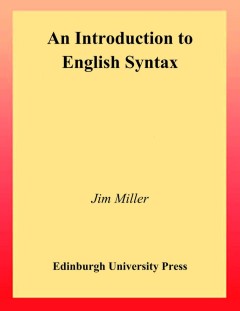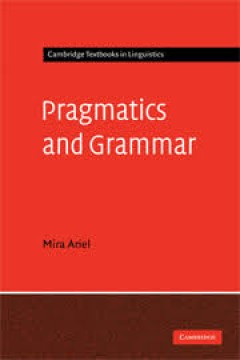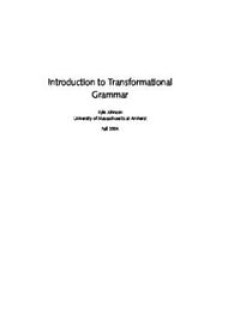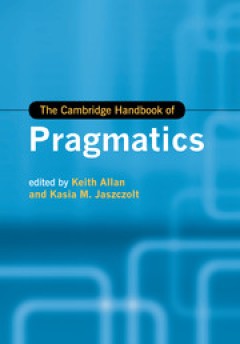Filter by

An Introduction to English Syntax
We study syntax because it enables human beings to compose complex messages. Suppose a disgruntled worker utters the single word idiot! He or she might have muttered stupid, unfeeling, ignorant idiot, with four words combined into a phrase. The speaker might even have said That stupid, unfeeling, ignorant idiot is the new manager!, in which the phrase the new manager and the phrase that st…
- Edition
- -
- ISBN/ISSN
- 0-7486-1254-8
- Collation
- -
- Series Title
- -
- Call Number
- 425 Mil a

Pragmatics and Grammar
When using language, many aspects of our messages are left implicit in what we say. While grammar is responsible for what we express explicitly, pragmatics explains how we infer additional meanings. The problem is that it is not always a trivial matter to decide which of the meanings conveyed is explicit (grammatical) and which implicit (pragmatic). Pragmatics and Grammar lays out a method…
- Edition
- -
- ISBN/ISSN
- 978-0-511-42295-9
- Collation
- -
- Series Title
- -
- Call Number
- 425 Ari p

Introduction to Transformational Grammar
- Edition
- -
- ISBN/ISSN
- -
- Collation
- -
- Series Title
- -
- Call Number
- 415 JOH i
- Edition
- -
- ISBN/ISSN
- -
- Collation
- -
- Series Title
- -
- Call Number
- 415 JOH i

The Cambridge Handbook of Pragmatics
- Edition
- -
- ISBN/ISSN
- 978-0-521-19207-1
- Collation
- -
- Series Title
- -
- Call Number
- 401.45 All t
- Edition
- -
- ISBN/ISSN
- 978-0-521-19207-1
- Collation
- -
- Series Title
- -
- Call Number
- 401.45 All t

Linguistic Anthropology
- Edition
- -
- ISBN/ISSN
- 978-0-511-06758-7
- Collation
- -
- Series Title
- -
- Call Number
- 410 Dur l
- Edition
- -
- ISBN/ISSN
- 978-0-511-06758-7
- Collation
- -
- Series Title
- -
- Call Number
- 410 Dur l

Kamus Bushou Aksara Mandarin
- Edition
- -
- ISBN/ISSN
- 979-98520-1-3
- Collation
- xiii+296hlm.;ilus.;14,5x20,5cm
- Series Title
- Mengenali Aksara Mandarin (Kanji) dengan Cepat dan Mudah
- Call Number
- 495.131 SUP k
- Edition
- -
- ISBN/ISSN
- 979-98520-1-3
- Collation
- xiii+296hlm.;ilus.;14,5x20,5cm
- Series Title
- Mengenali Aksara Mandarin (Kanji) dengan Cepat dan Mudah
- Call Number
- 495.131 SUP k

Researching Forensic Linguistics: Approaches and Applications
Researching Forensic Linguistics is an informative, hands-on guide to conducting research in forensic linguistics that can underpin legal and justice practices and address social justice problems involving language. Georgina Heydon takes readers step by step through the research process using case studies that draw on different types of forensic and legal language data such as police intervi…
- Edition
- -
- ISBN/ISSN
- 978-1-138-57599-8
- Collation
- viii+153hlm.;18,5x25x5cm
- Series Title
- Approaches and Applications
- Call Number
- 410.72 HEY r

Media Discourses
- Edition
- -
- ISBN/ISSN
- 0-335-21469-x
- Collation
- xi+201hlm.;ilus.;17x24cm
- Series Title
- Analysing Media Texts
- Call Number
- 401.41 MAT m
- Edition
- -
- ISBN/ISSN
- 0-335-21469-x
- Collation
- xi+201hlm.;ilus.;17x24cm
- Series Title
- Analysing Media Texts
- Call Number
- 401.41 MAT m

Conjunction in Psychology Program Students Written Text: Systemic Funcional L…
- Edition
- -
- ISBN/ISSN
- -
- Collation
- -
- Series Title
- -
- Call Number
- 410.72 SEM c
- Edition
- -
- ISBN/ISSN
- -
- Collation
- -
- Series Title
- -
- Call Number
- 410.72 SEM c

The Analysis of Slang Words Used by The Characters in No Hard No Feelings Mov…
- Edition
- -
- ISBN/ISSN
- -
- Collation
- -
- Series Title
- -
- Call Number
- 410.72 KRI t
- Edition
- -
- ISBN/ISSN
- -
- Collation
- -
- Series Title
- -
- Call Number
- 410.72 KRI t
 Computer Science, Information & General Works
Computer Science, Information & General Works  Philosophy & Psychology
Philosophy & Psychology  Religion
Religion  Social Sciences
Social Sciences  Language
Language  Pure Science
Pure Science  Applied Sciences
Applied Sciences  Art & Recreation
Art & Recreation  Literature
Literature  History & Geography
History & Geography